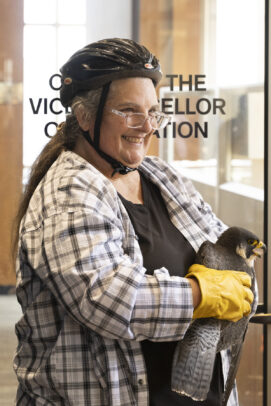Newest falcon brood debuts at UIC
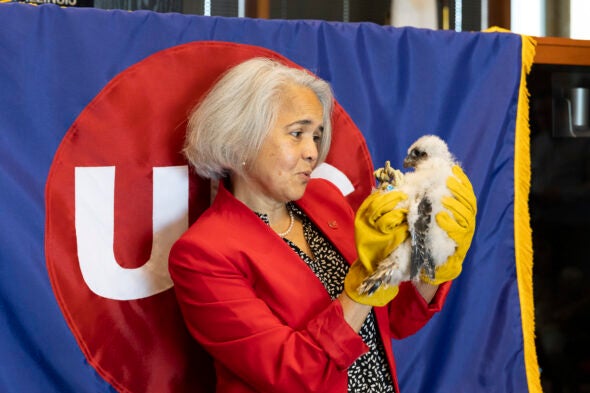
Since her arrival at the University of Illinois Chicago last summer, Chancellor Marie Lynn Miranda has shared the 28th floor at University Hall with a pair of peregrine falcons. Generations of birds have nested on the ledges of the building’s top floor, high up in the breeze, but what makes these two special is that they are one of about 15 pairs of peregrines in the Chicago area.
Early this spring, Miranda spotted several eggs. Then, during commencement weekend nearly a month ago, she watched as four chicks hatched. On May 28, she held one in her gloved hands as ornithologists from the Chicago Field Museum banded them, which they do with each year’s new brood.
“It was like holding a newborn and realizing how special it is that these creatures call UIC their home,” Miranda said. “You just felt all this hopeful possibility that this new life was in your hands, and we are going to do everything we can to make sure that they prosper.”
The fledglings, believed to be two males and two females, were born about 24 days earlier to the father, named Mouse, and mother, Loop. Mouse and Loop have nested at the building for over a decade. Peregrine falcons were first sighted on the 28th floor in about 1999. They even have their own Falcon Cam livestream.
In addition to these birds, a pair of adult birds and their two chicks live on the west side of campus, near the medical buildings.
To reach the chicks for banding, Field Museum ornithologist Mary Hennen held the large and gray-feathered Loop to keep the bird of prey from attacking fellow ornithologist Dylan Maddox, who scooped the four chicks from the ledge and placed them in a cardboard box. Loop was returned outside the window as her brood was brought into the chancellor’s conference room for banding. The process does not injure the birds.
Capturing falcons
The leg bands have numbers unique to each bird. They provide data on peregrine survival, dispersal distances and population growth. Hennen said the mild winter and early spring are expected to help boost the population of about 15 pairs in the Chicago area.
“This is going to be a really good year,” Hennen said.
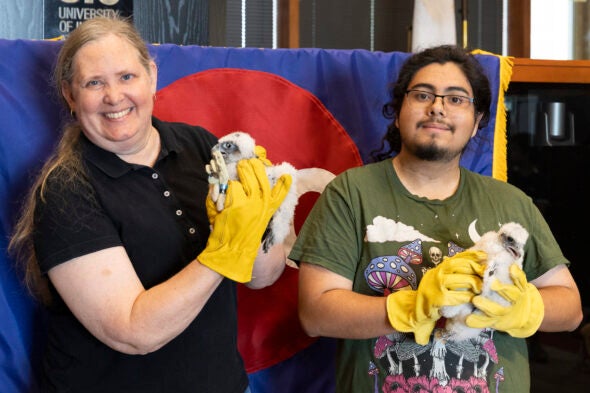
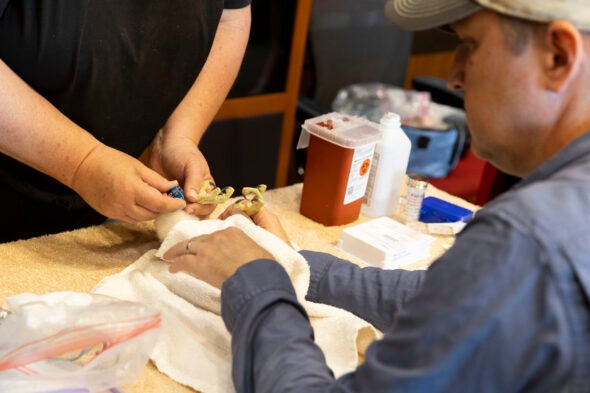
Once endangered, peregrine falcons have rebounded thanks to better awareness and less use of deadly insecticides such as DDT. The Field Museum ornithologists drew blood samples to determine the chicks’ genders and track their health as they cope with environmental factors.
People have trained Peregrine falcons to hunt for over 1,000 years and they are considered the fastest animal on the planet. They can reach speeds of more than 200 miles per hour during their steep dives. According to the Cornell Lab of Ornithology, the oldest recorded peregrine falcon lived to be nearly 20 years old.
Zuriel Aguilar, a UIC biology major focusing on ecology and evolution, was invited by his professor Karin Nelson to the banding and held one of the chicks. Aguilar, who wants to pursue a career in environmental monitoring, said that he knew there were falcons on campus, but he didn’t think about them much.
“Then, when I was told more about the program, I was excited to see how much UIC focused on the fact that we have these peregrines and keeping them monitored and safe,” said Aguilar, a junior from the Southwest Side of Chicago.
He said learning first-hand about the program reinforced his decision to study biology at UIC.
“It definitely makes me feel better knowing that there are programs for me to connect to and to know that people care,” he said. “Knowing that these falcons are real, that I’m able to interact with them directly, I know there are real consequences, good and bad, that I know I can influence to help better them in the future.”
While the banding was underway, Max Lopez and his father, Pete Lopez, were touring the UIC campus. They caught the banding process, and said the experience made UIC stand out compared to the other schools Max is considering to study computer science. “It’s pretty cool to see,” said Max, of Villa Park, Illinois. “I had no idea.”
Added his father, “The experience has just been great today, and it’s a special treat with the falcons. I really want him to go here. But it’s his decision, and he’s leaning toward it.”
UIC guides students and nature
Stacey Swearingen White, dean of the College of Urban Planning and Public Affairs, came to see the banding process. More than 30 years ago, she worked for an organization called the Peregrine Fund to reintroduce the falcon population in Wyoming after insecticides nearly killed them off. She said she was thrilled that the population is thriving in Illinois and at UIC, which she joined in 2022.
“When I learned there were peregrines here and I was exploring this opportunity, it felt like a signal to me that I was supposed to be at UIC,” she said.
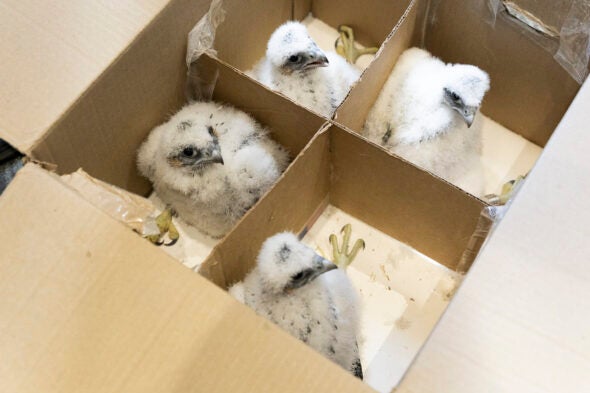
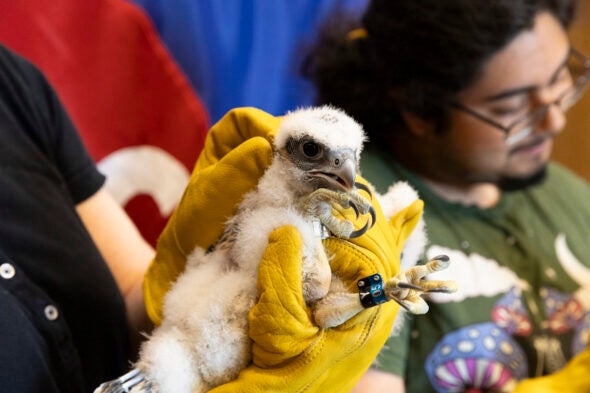
Miranda said one of the best parts of her job is knowing that the falcons are just outside her window and that UIC has helped increase the falcon population. Like a proud parent, Miranda is looking forward to naming them, but that won’t happen until the chicks get a little older and are sure to survive.
The names of last year’s brood were inspired by the views she sees from the 28th floor – which is why the mother was named Loop, and her fledglings were named Little and Italy. Miranda follows Loop daily on the Falcon Cam, often referring to her as Mamacita, a Spanish term of endearment that can be translated to “little mama.”
As she watched this year’s young birds squawk and flutter their downy feathers as they were banded, Miranda said she could relate to the mother, waiting out on the ledge for her chicks to rejoin her.
“I feel that connection to her. We’re trying to create this environment where our students can prosper, thrive, and grow in all kinds of ways,” Miranda said. “And I see how fiercely she fights for that and how hard she works for her offspring. That’s what we’re all trying to do here at UIC.”
Update: As of June 20, the Falcon Cam is offline and will return in early spring 2025. Loop, Mouse and a few chicks are still in the area, so you might see them soaring in the sky around the east side of campus, according to the Office of the Chancellor.
One chick was reportedly on the ground in front of University Hall. It was retrieved by a Chicago Bird Collision organization and taken to a rehabilitation facility in the west suburbs. After the chick receives a full evaluation, it will be rereleased.
Categories
Faculty, Students, UIC today, University
Topics
biology, College of Urban Planning and Public Affairs, Field Museum, peregrine falcon, sustainability
